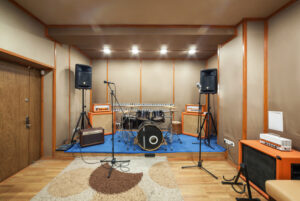4 Tips for Soundproofing a Room in Your Home: A Guide for Beginner Musicians
As a collective of dedicated music educators specializing in private lessons for beginners, we understand the importance of a conducive practice environment. One common challenge our students face is managing sound levels during practice sessions at home. To assist, we’ve compiled four effective tips for soundproofing a room in your home, ensuring a harmonious balance between practice and household tranquility.
1. Seal Gaps and Cracks
Sound can easily escape through small openings in doors and windows. Using weather stripping or acoustic sealant to seal these gaps can significantly reduce noise leakage. This simple step is crucial in maintaining a controlled sound environment.
2. Incorporate Soft Furnishings
Hard surfaces reflect sound, amplifying noise levels. Introducing soft furnishings like rugs, curtains, and upholstered furniture can absorb sound, reducing echoes and overall noise. This not only improves acoustics but also enhances the room’s comfort.
3. Utilize Acoustic Panels
Installing acoustic panels on walls and ceilings can effectively dampen sound. These panels are designed to absorb sound waves, minimizing reverberation and preventing sound from traveling to other areas. They are particularly beneficial in rooms dedicated to music practice.
4. Consider a Room-Within-a-Room
For those seeking advanced soundproofing, constructing a room-within-a-room can be an effective solution. This involves building a secondary structure within the existing room, creating an isolated space that significantly reduces sound transmission. While more involved, this method offers superior sound isolation.
Further Resources:
-
Explore our blog on creative solutions for practicing without disturbing others for additional insights.
-
Discover more soundproofing techniques in this Strings Magazine
Conclusion:
Implementing these tips for soundproofing a room in your home can greatly enhance your practice experience. By creating a controlled sound environment, you can focus on your musical development without concerns about disturbing others. As private music teachers, we encourage our students to consider these strategies to foster a productive and respectful practice space.
